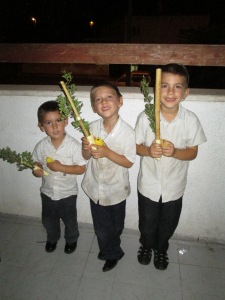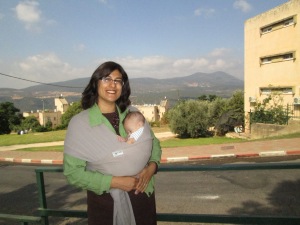What a lovely Sukkos we’re having so far!
Dd17 is great about doing crafts with the kids, and this Sukkos was no exception! The day or two before the holiday, she helped them make a beautiful diarama of a mini sukka, fully decorated inside with a table, chairs, paper chains hanging from the schach, and a table covered with tiny bowls of food (made of clay). She even affixed a light to the ceiling of the diarama!
She also helped them make the project below – a lulav and esrog.

They used small pieces of bamboo for the lulav, and attached leaves for the hadasim and aravos. For the esrog, she gave them each two sections of an egg carton which they taped together and then covered with yellow fabric. I think she said she affixed the dark brown ‘pitom’ (tip of the esrog) by sticking it on top of a stick that was inserted inside the esrog. The littles had a great time making these and getting into the holiday spirit!
While she was doing this, the other kids were making decorations for the sukka – a neighbor gave them a package of colorful patterned paper, and I was amazed at their creativity – they made a couple of hanging decorations that looked like what you would buy in the store. They also made the prerequisite paper chains (doesn’t everyone make these?? I remember making these as a kid!), and drew pictures to hang on the walls.
Last year, a neighbor who has two sukkas and lives just a few houses away offered us the use of their second sukka for our meals. They used to live in our apartment and know that the porch isn’t very large, definitely not big enough for a family our size to eat meals together there. We appreciatively accepted their offer and enjoyed hosting guests in their spacious sukka last year, and made a small sukka on our porch that was used for sleeping in and for individuals to eat in for non-formal holiday meals. This year, the husband spoke to my husband and apologetically told him that as much as they’d like to, they couldn’t make the same offer since they were hosting large communal events that would require the use of both of their sukkahs. We were so grateful for the use of their sukka last year and certainly didn’t feel they owed us any kind of apology for not being able to do the same thing again!
We decided that we’d manage with our small porch sukka for meals. True, some of us would be eating inside the house and others in the sukka, which wasn’t a super festive atmosphere, but you can only work with what you have. Buying a freestanding wood sukka was not only expensive but would take time and energy that dh just didn’t have. Then less than a week before Sukkos, dh got a call from a friend who had moved from Karmiel a number of months ago – he had left his sukka behind in a storage unit, and would we like to have it? Since he and his wife were just two people, I couldn’t imagine it could possibly fit us, but it was 6 feet wide by 12 feet long – not super spacious for our family, but definitely room for us all. We happily accepted his offer, and dh and the kids spent late Friday afternoon assembling it. (At that time, dd16 asked me if the middles should be doing something to get ready for Shabbos instead, As to where we put it, we’re lucky to be on a culdesac, therefore most of the people in our building don’t use the parking lot next to our building since they’d rather park right in front. Our parking lot gets minimal traffic; no cars ever go into the furthest third of it, which is where we put our sukka. The lot is paved with brick and lined with flower bushes and there’s a beautiful view of the hills as well, so it was very pleasant and there was plenty of room for the kids to safely run around and play during the meals. We felt so glad to have a sukka where we could all have our meal together!
Then on Sunday (erev Sukkos), dh spent the first few hours of the morning with Yirmiyahu at the pediatrician because we were concerned that he had an upper respiratory infection and I was warned by a couple of parents of children with T21 to be vigilant about this because it can quickly turn into something more complicated. Directly from that appointment I took Yirmiyahu with me to catch a bus to Maalot, where he had an appointment for an ultrasound on his kidneys and bladder. The bus driver told me to get off at the wrong place, so I had to ask a couple of people for directions to get where I was really supposed to be. The second person I asked was American, and as we chatted, I found out that she had just made aliyah a few weeks ago. As we chatted even longer, I asked her name and realized she had emailed me during her pilot trip right after Yirmiyahu was born, wanting to learn about Karmiel. Such a small world!
The appointment was a whopping fifteen minutes of waiting, then five minutes for the ultrasound itself. Since I had a couple more hours to wait until the bus back to Karmiel would be leaving, I strolled around the shopping district and picked up some beautiful laminated posters for our sukka – though the kids had made some decorations, this is only our first year decorating a sukka here and I knew there would still be empty space to fill. When I got home it was an hour before Sukkos, so I had just enough time to put the posters up and admire what everyone had done to the sukka before my last minute holiday preparations.
A few hours before Sukkos began, a neighbor offered us a loveseat that she was giving away. We didn’t need it for our home and she put it outside right before Sukkos began for whoever wanted it to take it. A couple of hours later we were having dinner in the sukka when ds6 told me he was tired and asked to lay down somewhere. I couldn’t let him go home to sleep since even though it was close by, no one would be with him, but then I realized that this loveseat (which had been put just a short distance from the sukka and was easily moved closer) would provide a comfortable place for him to lie down right outside the sukka. It ended up being used by a number of the kids as a place to sit and relax during all of the meals. Ds19 and ds10 slept in that sukka the first night, the others slept in our porch sukka. Then the next night dh slept with most of the boys in the big sukka, and the girls slept in the porch sukka. Holiday style camping out. 🙂
We had a little Sukkos style excitement when the first afternoon, we had strong gusting winds at the very end of lunch which lifted the bamboo mats that covered the top right up, up and away! (I was inside the house with Yirmiyahu when this happened, so ds5 ran inside and breathlessly told me about what happened – “A huge wind suddenly blew off all the schach and I was frightened!”) Ds19 had tied the bamboo mats on to our porch sukka (since last year they were blown off into our neighbor’s yard and I wanted to avoid a repeat of that), but only on one side, so they were blown against the wall and rolled up under the eaves of the building- it was a good thing this happened at the end of the meal since we were left without a kosher sukka!
There are local simchas beis hashoeiva celebrations (can’t think how to succinctly translate that, sorry) every night at various synagogues; I hope to make it to one or two of them. Tomorrow morning I’m going with the girls to an event that’s been organized for mothers and daughters. It’s so nice to have so many holiday oriented activities that have been arranged for the community; it really adds to the feeling of immersion in the weeklong holiday.
Avivah
